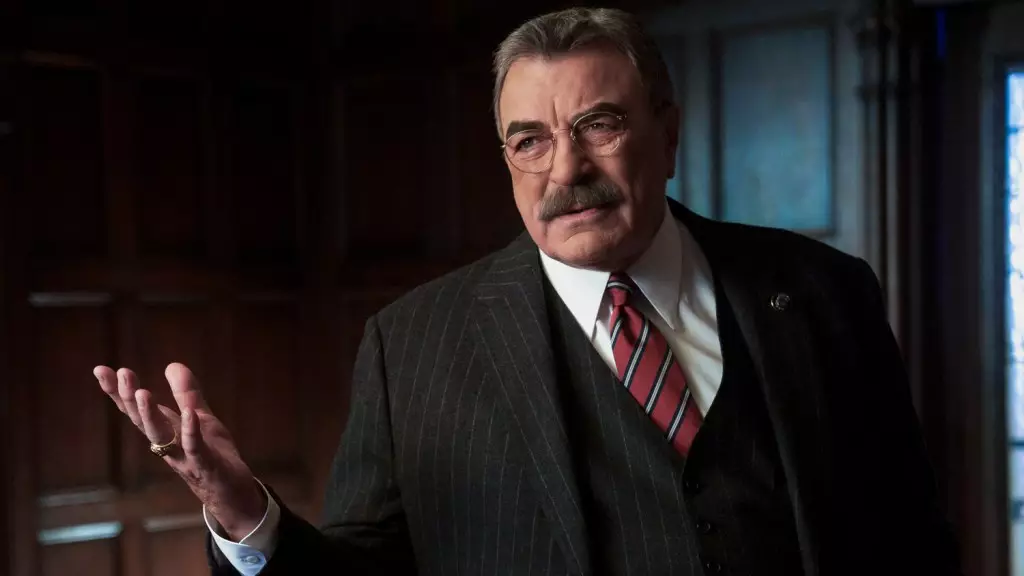Tom Selleck, the charismatic actor best known for his role as NYPD Commissioner Frank Reagan in CBS’s long-standing police drama, Blue Bloods, has openly shared his disappointment regarding the show’s impending conclusion. A recent interview with TV Insider uncovered Selleck’s feelings of frustration, as he articulated that despite the series’ remarkable performance and popularity, it has often been “taken for granted.” As the show nears its final episodes, which begin airing on October 18, 2023, Selleck’s reflections offer not only a personal lens into the challenges of television production but also spotlight broader industry trends in the cancellation of beloved shows.
Blue Bloods debuted on September 24, 2010, becoming a staple in American households, chronicling the lives of the Reagan family—a lineage steeped in law enforcement—amidst the bustling backdrop of New York City. Despite holding an impressive average of 8.1 million viewers, which is quite a feat in today’s fragmented television landscape, the series will conclude after a commendable 14 seasons and nearly 300 episodes. Selleck’s sentiment that the show is reaching its end despite its continued success raises crucial questions about how television networks evaluate shows beyond just viewer numbers.
Understanding Television Networks’ Decisions
It seems paradoxical that CBS would choose to let go of a successful series that not only maintains high viewership ratings but also garners a devoted fan base. Selleck’s assertion serves as a critique of how networks often prioritize financial considerations over audience loyalty and show quality. He observed that, while Blue Bloods consistently succeeded in its Friday night time slot, it appears that the show’s standing was not enough to shield it from cancellation pressures linked to rising operational costs.
In his remarks, Selleck mentioned an interesting notion: if a network were presented with a guaranteed hit program, it would be hard to imagine them choosing to bury it in a less desirable time slot. This commentary highlights the often baffling decisions made in executive boardrooms—where business imperatives can overshadow creative successes. The convergence of high operational costs, changing viewer habits, and a shifting landscape of streaming options likely culminates to make it difficult for long-running shows like Blue Bloods to secure continuity.
Selleck’s loyalty to the series and its cast is palpable, as he expressed hopes that CBS might reconsider its decision to end the series. In previous statements, he has emphasized the quality of the ongoing storytelling and the cast’s enthusiasm to continue creating content that resonates with viewers. The comment about “not sliding off down a cliff” suggests an ongoing narrative vitality—a feature that often distinguishes enduring shows.
At a press conference led by CBS Entertainment president Amy Reisenbach, the reality of Blue Bloods’ conclusion was firmly stated, indicating the network’s desire to “refresh the schedule.” The implication that all shows eventually reach their conclusion sounds almost ubiquitous in the industry, yet it raises uncomfortable questions. How should networks balance refreshing their programming with honoring series that still capture significant viewer engagement? The collective desire for continuity from the cast, including Selleck, inevitably complicates this narrative of renewal.
Selleck’s candid acknowledgment of the emotional aftermath of the show’s end encapsulates the human side of television production, where actors invest not just time but portions of their lives into their roles. His reflections on how the absence of a Monday rehearsal elicits an abrupt end to a chapter exemplifies the way show cancellations can impact the lives of those involved.
As audiences prepare to bid farewell to the Reagan family, the legacy of Blue Bloods embodies more than just a long-running series; it encapsulates a familial bond and robust storytelling that has connected deeply with viewers. With its intricate discussions about morality, justice, and family legacy framed against the realities of modern law enforcement, the show established a unique space within the police procedural genre. The culmination of the series reflects a complex interplay of viewer loyalty, network decision-making, and the broader narrative of evolving media consumption.
Selleck’s reflections highlight the intrinsic conflicts at play in the entertainment industry. They provoke deeper examination into the value systems of television networks and challenge audiences to consider what is lost when beloved series meet their manufactured ends. As Blue Bloods prepares for its final bow, it leaves behind not just memories but also unanswered questions about the evolving landscape of television.

